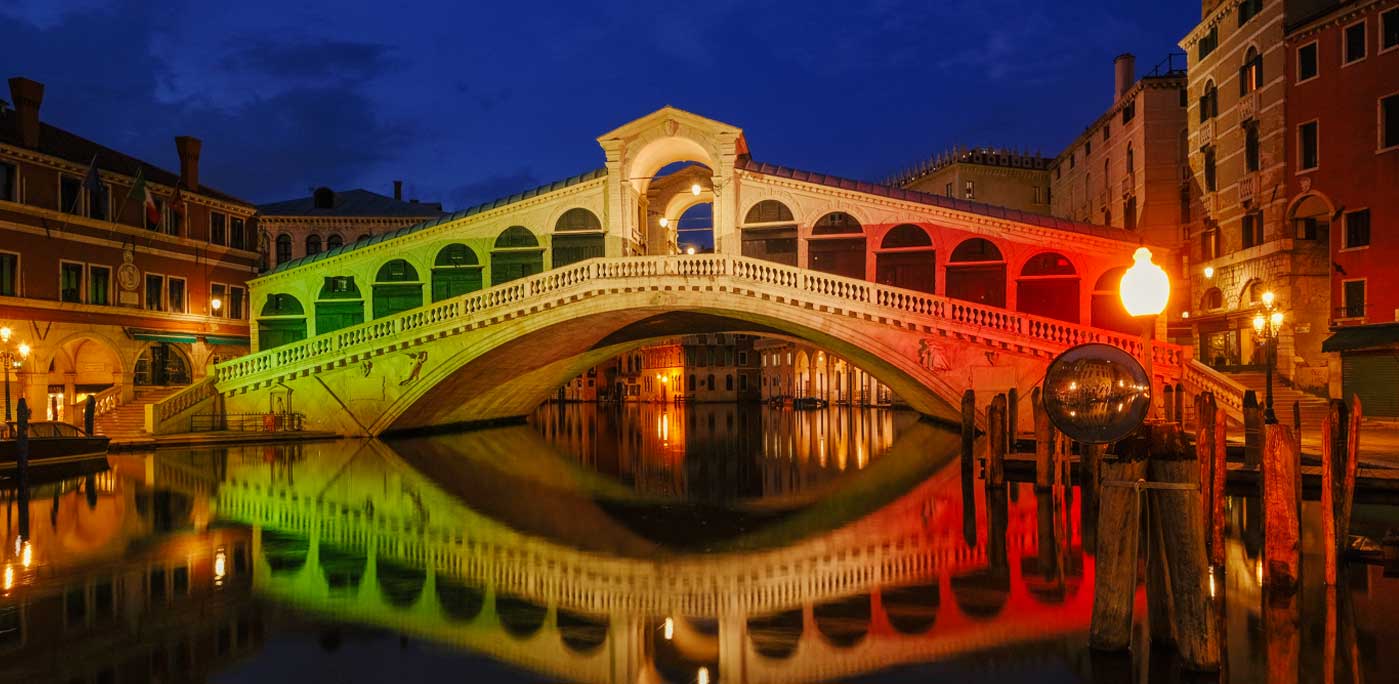We are going to press when Italy has just surpassed 80.000 positive coronavirus cases, aware of how the peak has yet to come in spite of the drastic containment measures implemented. Here in the United States, the emergency has only just begun, following the modes of the rest of the world when it came face to face with the virus. Disbelief, inability to change personal habits, skepticism, fatalism, irresponsibility, alarmism thrown against the ridiculing of our first cautionary measures.
Always keeping in mind, of course, that one should never joke about people’s health, every reaction is acceptable, provided it’s not inadequate. In spite of the first, mildly confused but fiercely aggressive reactions of China and Italy, which should have served as case studies, the rest of the world has been dealing with the arrogance of politics and economy, of high finance and the productive system, of the idea all that is a machine we cannot stop, because the consequences will be unmeasurable.
Truth is, there will be consequences. We can call them stagnation, recession, or extremely serious losses, you can choose the expression you prefer, but the substance won’t change and it’ll be the weakest, as usual, to suffer the most.
Without a doubt, this immense ocean wave that has been shaking all social systems in the world reveals all our fragility and how “we are all in the same boat.”
In a world as globalized as ours, all that seems far is, in truth, just outside our door and we are probably getting full conscience of it during this pandemic.
The Butterfly Effect, studied in mathematics and made popular by Spielberg’s Jurassic Park, materialized. This is exactly what “a butterfly moves its wings in Beijing and New York gets rains instead of the sun” means: small variations in the initial conditions can cause enormous ones in the long term functioning of a system.
Viruses spread following the simplest of criteria: surviving, multiplying, proliferating and, to do so, they don’t look anyone in the eye. Just like Totò wrote in his very famous poem ‘A Livella, one of Naples’ poetic masterpieces, known internationally for the beauty of its verses. The piece offers important thoughts within the frame of an everyday conversation that has in it all the essence of the city of Naples.
Antonio de Curtis was one of the greatest comic artists of Italian theatre and early television, so revered he deserved the nickname of Prince of Laughter. In 1964 he took everyone off guard when he recounted the diatribe between two souls, a marquis and a garbage collector, who ended up being buried one beside the other by chance. The tomb of the first is elegant and opulent, while that of the second is “piccerella, abbandunata, senza manco un fiore” (tiny, abandoned, without even a single flower). The marquis complains about being so close to the dustman, who stinks of misery to him. The pauper’s answer is a pearl of wisdom: when death comes, she makes us all the same, regardless to what we once were. She works like “ ‘a livella,” a bubble level, the instrument used in construction to measure the horizontality of a surface. It’s only the living who believe in social differences, or to say it better, “sti ppagliacciate,” who believe in this nonsense. The poem’s conclusion brings together the essence of all reflections: “Nuje simme serie… appartenimmo à morte,” (we’re serious, we belong to death), that is, we dead people are serious, we’re all the same, for us distinctions don’t exists.
This means that, right now, there is no reason to point the finger at someone or something. Rather, we should get together, work as a system, as soon as possible. We’re all in the same boat and we all have to row together in the same direction if we want to get out of this storm.
But if we want to follow the lesson coming from Italy, then the virus can also teach us something else. Beyond the super-human effort of our doctors and nurses on the front line, this forced collective quarantine has turned into a precious occasion to understand that overcoming hard times alone is not simple, but things get easier if we do it as a community: as a group we have more courage and more strength.
This is the lesson we learned from Italy’s apartment buildings, blocks and cities: they called them “flash mob” but they’ve really been important moments of contact among neighbors who may have not even known each other before. This has been the reaction of people forced home, who understood that seeing someone, finding a smile, having a chat from the window, singing and dancing together for 10 minutes could help feel stronger, react, not be afraid, fight against the virus. Just as if we all said together: “sure, we’re staying home sacrificing all of our liberties, the possibility of hugging our family and spending time with our friends, our habits, our income, our job. But by doing so, you damned virus, we’ll make you weak, we’ll fight you, we’ll break all of your bridges and chains of contagion. We’ll win, in the end.”
In Italy, the virus also created a peak in connectivity: do you know how many phone calls, video calls and messages are exchanged every day? All platforms have become popular ways to keep in touch with people.Everyone started looking for their friends, speaking with distant relatives, tracing people they had lost contact with to make sure everything was ok. Yes: among many horrible, catastrophic things, this virus managed to bring families closer and rekindled relationships, creating a wonderful “infection of humanity.”
Before this tsunami hits the West Coast, overwhelming and changing silently the existence of so many, let’s be quick and follow the example of Italy. Let’s understand how good this “infectious humanity” can be, even if it simply stands at a window.
Andiamo in stampa leggendo che l’Italia ha superato gli 80mila positivi al Coronavirus, consapevole che il picco del contagio è ancora lontano, nonostante le drastiche misure di contenimento messe in atto. Qui negli Stati Uniti, l’emergenza è appena cominciata più o meno nelle modalità che hanno caratterizzato tutti gli altri Paesi, nella curva di diffusione del nuovo virus. Incredulità, incapacità di cambiare le abitudini, scetticismo, fatalismo, irresponsabilità, toni allarmistici contro ridicolizzazione delle misure cautelative. Premesso che sulla salute non si dovrebbe mai scherzare, ogni reazione è lecita a patto di non rivelarsi inadeguata. Un po’ in tutti i Paesi, nonostante le prime spaesate ma aggressive reazioni della Cina e dell’Italia che pure potevano servire da case study, si sta facendo i conti con l’arroganza della politica e dell’economia, dell’alta finanza, del sistema produttivo e della macchina che non si può fermare pena danni incalcolabili.
Ma i danni ci saranno eccome. Chiamiamoli pure stagnazione, recessione o gravi perdite. Ognuno scelga la forma che preferisce. La sostanza non cambierà e i più deboli, come al solito, ne pagheranno le conseguenze. Quel che è certo è che questa gigantesca onda oceanica che sta facendo traballare tutti i sistemi sociali mondiali, sta rivelando quanto siamo fragili e come “siamo tutti nella stessa barca”.
Tutto quel che sembra lontano, in questo mondo globalizzato di cui forse tutti stiamo finalmente avendo piena coscienza proprio attraverso questa pandemia, è in realtà sull’uscio di casa.
Si è materializzato l’Effetto Farfalla studiato in matematica e reso popolare dal film Jurassic Park di Spielberg. Ecco cosa significa dire “Una farfalla batte le ali a Pechino e a New York arriva la pioggia invece del Sole”. L’idea è che piccole variazioni nelle condizioni iniziali producano grandi variazioni nel comportamento a lungo termine di un sistema.
Un virus si diffonde con un criterio semplicissimo: sopravvivere, moltiplicarsi e proliferare. E per farlo non guarda in faccia a nessuno. Esattamente come diceva Totò nella sua famosissima ‘A Livella. Uno dei capolavori della poesia napoletana, nota a livello internazionale per la bellezza dei suoi versi che offrono riflessioni di intenso significato dentro la cornice di una conversazione popolare che ha tutto il sapore e l’essenza partenopea.
Antonio de Curtis, uno dei più grandi artisti comici della storia dell’arte del teatro e della prima televisione italiana, tanto da meritare e conservare nel tempo l’appellativo del ‘Principe della risata’, nel 1964 spiazzò tutti raccontando il battibecco tra due ombre: un marchese e un netturbino, casualmente sepolti l’uno accanto all’altro, il primo in un sepolcro fastosamente ornato e il secondo in una tomba “piccerella, abbandunata, senza manco un fiore”. Il marchese si lamenta della vicinanza con il netturbino del quale disprezza la puzza di miseria. La replica è una perla di saggezza: indipendentemente da ciò che si era in vita, col sopraggiungere della morte si diventa tutti uguali, grazie all’azione della morte che è come la livella, lo strumento usato in edilizia per stabilire l’orizzontalità di un piano. Sono solo i vivi che fanno differenze sociali, o meglio, che fanno “Sti ppagliacciate”, e credono in queste pagliacciate. La conclusione tira le somme di ogni riflessione: “Nuje simme serie… appartenimmo à morte” cioè noi morti siamo seri, siamo tutti uguali, per noi non esistono distinzioni di nessun genere.
Per questo non è il caso di puntare il dito contro qualcuno o qualcosa in questo momento altamente critico ma di fare sistema, al più presto. Siamo tutti nella stessa barca e bisogna remare tutti nella stessa direzione, se è vero che tutti vogliono uscire quanto prima da questa tempesta terribile che sconvolge la vita di tutti.
Ma questo virus ci sta insegnando anche un’altra cosa, se vogliamo ascoltare la lezione che viene dagli italiani. Al di là dello sforzo sovrumano di medici e infermieri che stanno combattendo al fronte, per tutti coloro che chiusi in casa cercano di bloccare l’epidemia, la quarantena collettiva è diventata un’occasione preziosa per scoprire che da soli è difficile superare le avversità e che affrontarle insieme, aumenta il coraggio e la forza.
E’ la lezione che è arrivata dai balconi dei condomini, dai quartieri e dalle città italiane: li hanno chiamati flash mob ma sono spesso state occasioni importanti di contatto tra vicini che nemmeno si salutavano, la reazione di persone chiuse in casa che però hanno capito che vedere un volto, trovare un sorriso, scambiare una chiacchiera fra dirimpettai, cantare insieme o ballare dieci minuti insieme serviva a sentirsi più forti, a reagire, a non avere paura e a combattere contro il virus: come se tutti dicessero insieme: sì, restiamo a casa sacrificando tutte le nostre libertà, la possibilità di abbracciare i nostri familiari, di trascorrere tempo con gli amici, le nostre abitudini, i nostri stipendi, il nostro lavoro ma così facendo, maledetto virus, ti depotenzieremo, ti contrasteremo, taglieremo i tuoi ponti e le tue catene di contagio. Alla fine vinceremo.
In Italia questo virus ha anche generato un picco altissimo di connettività: sapete quante telefonate, videochiamate e messaggi vengono scambiati? Tutte le piattaforme sono diventate reti di contatto frequentatissime. Tutti hanno cominciato a cercare gli amici, a sentire i parenti lontani, a rintracciare la gente che non si sentiva da tanto per sapere se era tutto ok. Sì, tra le tante cose brutte e catastrofiche, questo virus ha riavvicinato le famiglie e rinsaldato i rapporti generando un meraviglioso “contagio di umanità”.
Prima che nella West Coast arrivi quest’onda anomala e prepotente che come uno tsunami travolgerà silenziosamente la vita di tanti, non perdiamo tempo e prendiamo esempio dall’Italia che ci sta mostrando, anche dai balconi di casa, quanto bene faccia questa “contagiosa umanità”.






























